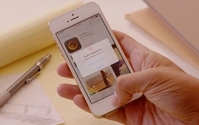
Much of
the speculation over Apple’s Sept. 9 press event has centered on rumors that the tech giant will introduce a larger-screen iPhone and a wearable device. Last week,
Wired also tossed out the tidbit that the next-generation iPhone will come equipped with a near-field communication (NFC) chip to
power mobile payments.
Apple's entrance into mobile payments itself has been the source of speculation for some time, given that it's sitting on some 800 million iTunes accounts, mostly linked to
debit and credit cards. In addition, the company has taken steps toward expanding payments beyond its own ecosystem, with the rollout of its Passbook mobile wallet in 2012, and the incorporation of a
fingerprint ID sensor in the iPhone 5, adding a security layer for transactions.
advertisement
advertisement
Earlier this year, Apple CEO Tim Cook openly acknowledged that mobile payments is an area the company has been
“intrigued with,” adding that it was one of the reasons behind putting the Touch ID button in the iPhone 5. Apple this year also rolled out its iBeacon system, which retailers and
marketers have adopted for in-store mobile marketing.
In its own stores, Apple also allows iTunes users to top up their accounts in-store through a store associate. This allows people who may
not have a credit or debit account to add to iTunes balances for use online or in stores.
With all that in mind, a new IDC report points out that Apple is not interested in mobile payments to
make money so much as to give people another reason to keep using its devices. “What [Apple] is trying to do is put in technology that makes their phones useful. This is not about Apple trying
to disrupt or dominate payments in any way,” said James Wester, research director for IDC Financial Insights and author of “Business Strategy: Apple and the Payments Tipping
Point.”
He points out that for all Apple's talent for design, smartphones are largely indistinguishable from each other as hardware, with the differences often at the margins —
slightly longer battery life or larger screens. Given the fierce competition in smartphones, providing additional services is crucial — hence Apple’s interest in payments.
In that
light, Wester said in an interview that he does not expect Apple to make any game-changing announcement in relation to mobile payments. He suggests the company's initial foray outside its own
ecosystem will be to streamline mobile payments online rather than make purchases in physical stores via the iPhone.
Even if the iPhone 6 is NFC-enabled, it won't necessarily be used for
payments. Wester noted that the technology can also be used for a variety of other purposes like identification, device pairing, and gaining access to buildings. The bigger point is that Apple wants
people to use its devices as “keys for reaching the cloud,” according to the study.
Even so, Apple's push deeper into payments will benefit the emerging space,
“creating a tipping point for the adoption of mobile payments both for consumers and merchants.” But it won't happen overnight, especially when it comes to paying via mobile in stores.
Apple will take its time working with different stakeholders — merchants, card issues, processors, point-of-service (POS) technology companies — to ensure a smooth user experience.
What about the impact on potential competitors like PayPal, Square and Isis? The report suggests that Apple's move into payments would have a halo effect on players like PayPal and MCX, the
merchant-backed mobile wallet venture. “Both of those companies will likely end up with their apps on Apple devices, sitting side by side with whatever app Apple will use to make payments
(though it is doubtful that PayPal would have access to Apple's fingerprint scanner).”
PayPal
itself may not view Apple’s payments push as such a welcome development. It already has a partnership with Samsung in which it powers transactions through a fingerprint sensor on the
manufacturer’s Galaxy S5 smartphone.